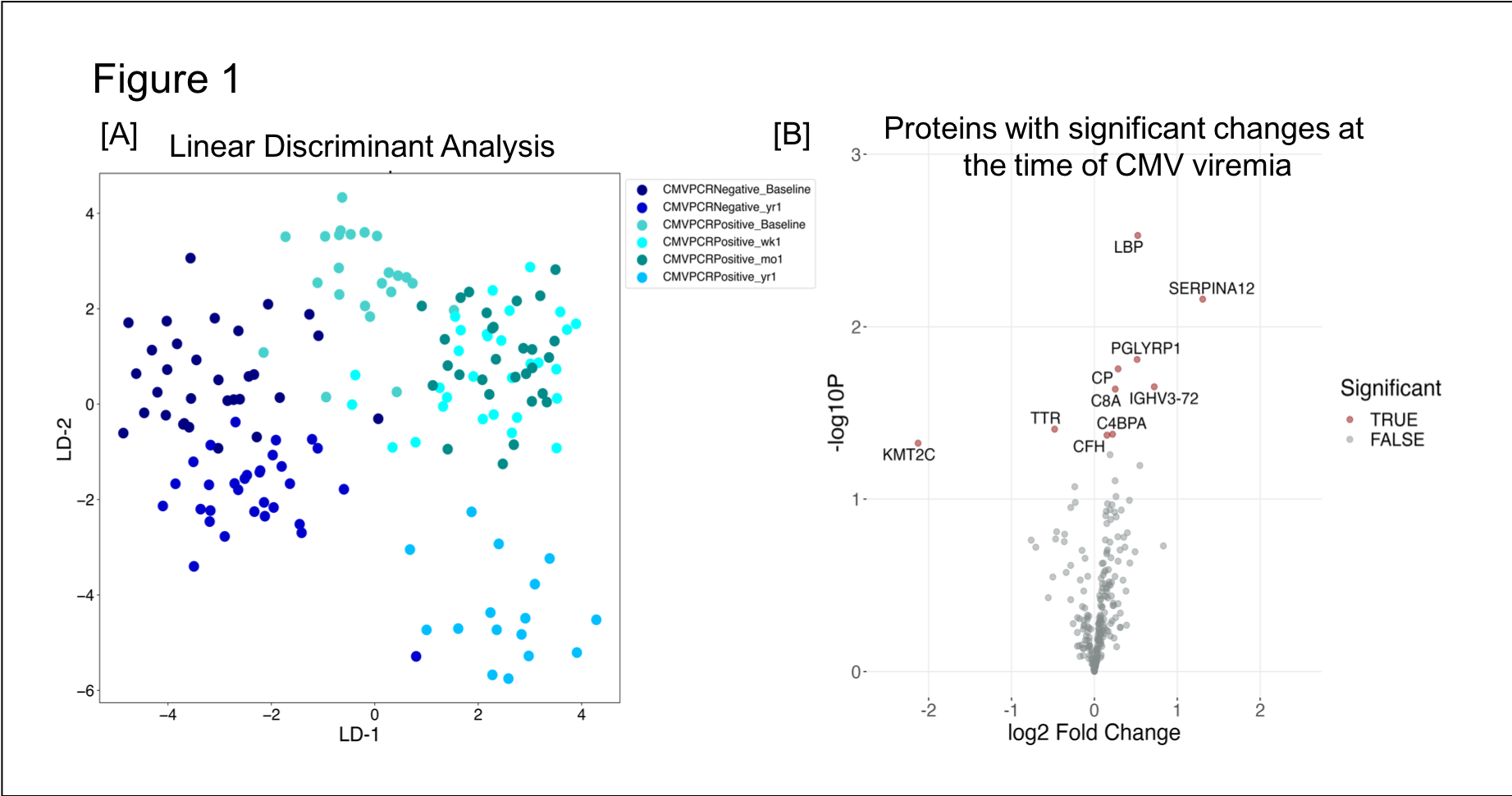Circulating Plasma Proteomics Analysis of CMV Infection in Kidney Transplantation
1UCSF, San Francisco, CA, 2UCLA, Los Angeles, CA, 3Harvard Medical School, Boston, MA
Meeting: 2022 American Transplant Congress
Abstract number: 1302
Keywords: Cytomeglovirus, Kidney transplantation
Topic: Basic Science » Basic Science » 16 - Biomarkers: -omics and Systems Biology
Session Information
Session Name: Biomarkers: -omics and Systems Biology
Session Type: Poster Abstract
Date: Monday, June 6, 2022
Session Time: 7:00pm-8:00pm
 Presentation Time: 7:00pm-8:00pm
Presentation Time: 7:00pm-8:00pm
Location: Hynes Halls C & D
*Purpose: Cytomegalovirus (CMV) infection is a threat to kidney transplantation. We studied circulating host proteome perturbations due to CMV infection in kidney transplantation as it could provide further insight on CMV infection and pathogenesis.
*Methods: We performed LC-MS-based proteomics using 168 plasma samples collected pre- and longitudinally post-CMV viremia from 62 propensity score-matched UCLA kidney transplant patients of which 31 were CMV positive and 31 were CMV -ve. Recipients were sampled 3 and 12 months after transplant, with additional samples 1 week and 1 month after viremia. All data were log2 transformed for the analysis. Differential expression analysis was conducted by using R and Limma. T-tests were conducted by using the built-in statistics functionality in the R environment.
*Results: Using Linear Discriminant Analysis, protein profiles with 241 plasma proteins were able to separate samples based on CMV viremia status and based on post-viremia time (Fig1A). Analysis of plasma proteins at the baseline pre-infection resulted in a set of 17 proteins whose levels were either increased (n=6) or decreased (n=11). The most significantly increased protein was Lysine Methyltransferase 2C (KMT2C) with 3.38 fold increase (p=0.05) in CMV+ve samples and most significantly decreased protein was Immunoglobulin Lambda Variable 7-43 (IGLV7-43) with 2.17 fold decrease (p=0.01). The significant proteins were enriched in plasminogen activation and blood coagulation pathways as the top two biological pathways. The protein profile of baseline samples of CMV +ve patients was compared with protein profiles of 1-week post-viremia samples which resulted in ten significantly changed proteins (p<0.05). The significant proteins' expression direction and significance are presented as a volcano plot (Fig1B). Increased proteins at the time of CMV+ve viremia (1-week post-viremia) included Serpin Family A Member 12 (SERPINA12) with p-value 0.01 and 2.47 fold increase and Immunoglobulin Heavy Variable 3-72 (IGHV3-72) with p-value 0.02 and 1.65 fold increase. Transthyretin (TTR ) and Lysine Methyltransferase 2C (KMT2C). CMV-specific proteins were enriched with functions such as protein activation cascade (p=1.42E-06) and regulation of acute inflammatory response (p=0.0001).
*Conclusions: We have identified plasma proteins that strongly correlate with CMV viremia in kidney transplantation and provide an insight about biological changes due to CMV viremia.
To cite this abstract in AMA style:
Sigdel T, Boada P, Gjertson D, Rossetti M, Fatou B, Steen H, Schaenman J, Bunnapradist S, Reed E, Sarwal M. Circulating Plasma Proteomics Analysis of CMV Infection in Kidney Transplantation [abstract]. Am J Transplant. 2022; 22 (suppl 3). https://atcmeetingabstracts.com/abstract/circulating-plasma-proteomics-analysis-of-cmv-infection-in-kidney-transplantation/. Accessed February 18, 2026.« Back to 2022 American Transplant Congress

